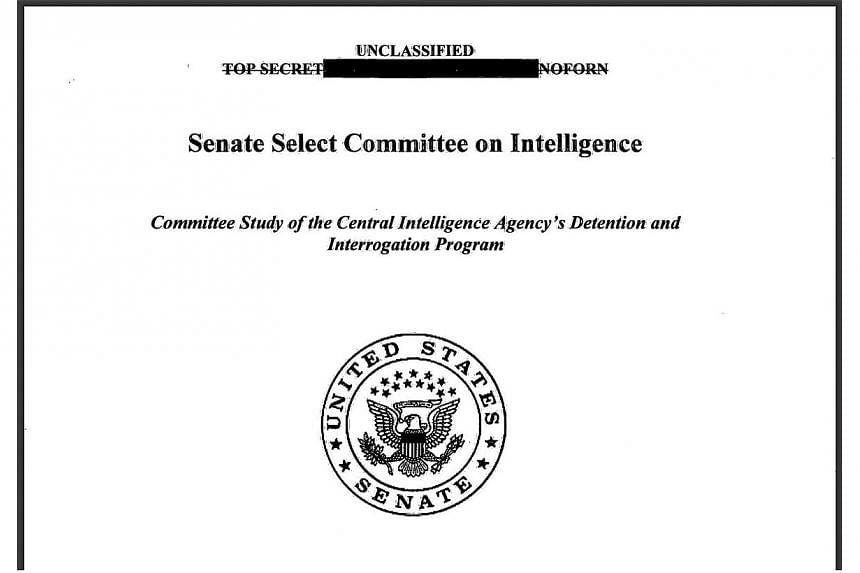WASHINGTON (REUTERS) - One of the two psychologists who devised the CIA's harsh Bush-era interrogation methods said on Wednesday that a scathing US Senate report on the torture of foreign terrorism suspects "took things out of context" and made false accusations.
"It's a bunch of hooey," James Mitchell told Reuters from his home in Florida when asked for his response to the Senate Intelligence Committee's findings released on Tuesday. "Some of the things are just plain not true."
A day after the Senate report was issued, the US Defence Department said it was shutting its detention facility at Bagram and no longer has custody of any prisoners in Afghanistan, closing another controversial chapter of Washington's long fight against Islamic militancy.
At the same time, fallout from the Senate report mounted, with the United States facing criticism from the United Nations as well as foreign governments that Washington often reprimands for human rights violations.
The Senate report concluded CIA interrogation tactics were ineffective and often too brutal.
The CIA paid US$80 million (S$105 million) to a company run by the two former Air Force psychologists without experience in interrogation or counter-terrorism who recommended waterboarding, slaps to the face and mock burial for prisoners captured after the Sept 11, 2001 attacks, according to the Senate investigation.
Mitchell and his colleague, Bruce Jessen, are referred to in the report by pseudonyms but intelligence sources have identified them by name. Jessen could not be reached for comment.
The Senate report questioned the psychologists'qualifications and accused them of violating professional ethics as architects of a system that Dianne Feinstein, chair of the Senate Intelligence Committee, said amounted to the torture of some CIA detainees.
Mitchell declined to cite specifics of what he considered wrong in the report, saying in a brief telephone interview: "I have a non-disclosure agreement (with the government) and cannot confirm or deny that I was involved in that thing."
But he suggested that there was political bias behind the report, which was put together by the committee's Democratic majority. He said the report's finding "should have been hashed out in a bipartisan way before they decided to smear" those involved in the interrogation program.
The CIA outsourced more than 80 per cent of its interrogation program to the company, Mitchell Jessen & Associates of Spokane, Washington, for its work from 2005 until the termination of the arrangement in 2009. The CIA also paid the company US$1 million to protect it and its employees from legal liability.
- US jail at Bagram closed -
Also on Wednesday, the Pentagon said it had closed its last detention facility at Bagram airfield, the largest US base in Afghanistan, with the transfer to Afghan custody of two Tunisians and the release of a Jordanian "pending repatriation or resettlement" with International Red Cross assistance.
The US military had rushed to empty the small jail of prisoners it would no longer be allowed to keep in Afghanistan when the mission for US-led force there ends later this month.
A US official said the prisoner transfers was a requirement under a US-Afghan security pact and was not related to the Senate report.
The final phase of US deliberation on what to do with the last prisoners held at the prison north of Kabul had rekindled outrage among Afghans over the US policy of rendition in the early phases of the Afghan war.
Responding to the Senate report, some US allies, who could face embarrassment or legal liability for any role in the CIA's "enhanced interrogations" during the administration of former President George W. Bush, either condemned the CIA's methods or played down any involvement by their governments.
"The CIA's practice of torture is gruesome," German Justice Minister Heiko Maas told German newspaper Bild. "Nothing justifies such methods. Everybody involved must be legally prosecuted." Zeid Ra'ad Al-Hussein, the UN high commissioner for human rights, said according to the Convention Against Torture, not even a state of war justified torture.
A White House spokesman said the US Justice Department had reviewed the interrogations and found no reason to indict anyone.
Former US Vice President Dick Cheney told Fox News on Wednesday that the report was "full of crap."
"How nice do you want to be to murderers of 3,000 Americans on 9/11?" Cheney asked. "I think that what needed to be done was done. I think we were perfectly justified in doing it and I'd do it again in a minute."
China, Iran and North Korea, regularly under fire for their human rights records, prodded Washington on its methods.
"China has consistently opposed torture," Foreign Ministry spokesman Hong Lei said. "We believe that the US side should reflect on this, correct its ways and earnestly respect and follow the rules of related international conventions."
A Twitter account associated with Iranian Supreme Leader Ayatollah Ali Khamenei said the report showed the US government was a "symbol of tyranny against humanity."
North Korea's Foreign Ministry accused the United Nations of ignoring "inhuman torture practiced by the CIA" while focusing too much on Pyongyang's human rights practices.

